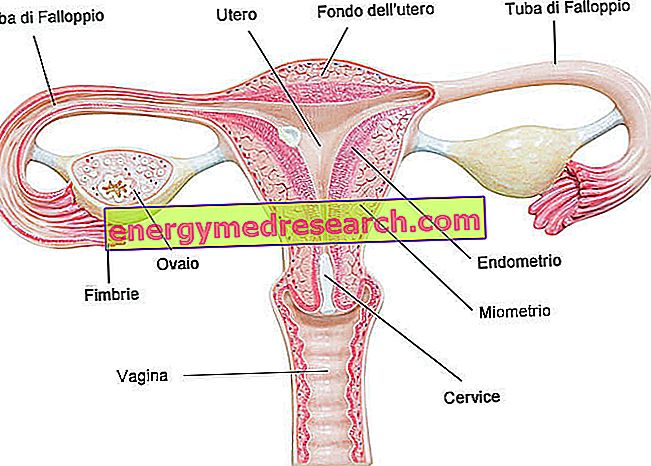Related articles: Adrenal insufficiency
Definition
Adrenal insufficiency is a chronic disease caused by the inability of the adrenal glands to produce sufficient amounts of hormones compared to the needs of the body.
Located on the upper portion of each kidney, the adrenal glands consist of a cortical part (outside) and a medulla (inside), each of which has distinct endocrine functions.
In particular, the adrenal cortex secretes a group of hormones collectively defined as adrenocorticoids, which include: mineralocorticoids (mainly aldosterone), glucocorticoids (such as cortisol) and sex hormones (androgens).
The adrenal medulla, on the other hand, contains chromaffin cells that secrete catecholamines (including adrenaline, noradrenaline and dopamine).
The secretion of these hormones is mainly controlled by nerve stimuli, therefore the hypofunction of the adrenal glands (hypoadrenalism) can be:
- Primitive : form also known as Addison's disease, depends on a dysfunction of the adrenal gland itself; the clinical picture is supported by a mixed deficiency of glucocorticoids, androgens and mineralocorticoids.
- Secondary : the reduced and / or insufficient function of the adrenal gland occurs when the pituitary cannot produce a sufficient amount of adrenocorticotropin (ACTH), a hormone that stimulates the production of cortisol.
- Tertiary: the dysfunction of the adrenal gland derives from an inability of the hypothalamus to stimulate the pituitary production of ACTH.
In secondary and tertiary forms of hypoadrenalism, a deficiency of glucocorticoids prevails.
Primary adrenal insufficiency
Addison's disease is a disease that depends on the primary malfunctioning of the adrenal glands.
Hypofunction is insidious and generally progressive; this condition tends to become clinically evident following metabolic stress, acute infections (a common cause is septicemia) or trauma.
Addison's disease may be due to a gradual destruction of the adrenal gland, often due to autoimmune diseases (in which a production of autoantibodies against the adrenal gland occurs). Other causes of adrenal degeneration include tumors, infiltrative diseases (such as amyloidosis, histoplasmosis and sarcoidosis), granulomas (eg TB), acute hemorrhagic pictures or inflammatory necrosis.
Primary adrenal insufficiency can also derive from iatrogenic causes, ie from the administration of drugs that inhibit corticosteroid synthesis (eg ketoconazole, aminoglutethimide and metopirone) or from a bilateral adrenalectomy.
Furthermore, Addison's disease may depend on defects in the enzymes involved in the adrenal production of hormones, or from forms of resistance of receptors subjected to the action of ACTH and glucocorticoids.
In children, the most frequent cause of primary failure is altered adrenal development (congenital hyperplasia).
Addison's disease can coexist with diabetes mellitus or hypothyroidism.
Secondary and tertiary adrenal insufficiency
Secondary and tertiary adrenal insufficiency are consequences of poor stimulation of the adrenal gland by the pituitary gland (secondary hypoadrenalism) or hypothalamus (tertiary hypoadrenalism); in both cases, we talk about central hypoadrenalism.
These forms of adrenal insufficiency can occur in the presence of expansive or infiltrative tumors, surgery or radiotherapy, infections or traumas that destroy pituitary or hypothalamic tissue.
Central hyposurenalism can also result in the isolated ACTH deficiency and as a consequence of the sudden interruption of treatment with corticosteroids, due to the temporary difficulty of the hypothalamic-pituitary-adrenal axis to resume its function.
Most common symptoms and signs *
- Anorexia
- Asthenia
- aSTHENOSPERMIA
- Azoospermia
- Decline in sexual desire
- Cardiomegaly
- Depression
- Desire for salty food
- Diarrhea
- Dehydration
- Abdominal pain
- Articolar pains
- Muscle pains
- Eosinophilia
- Temperature
- Sore legs
- Glycosuria
- hyperkalaemia
- infertility
- Hypoglycemia
- Hyponatremia
- weakness
- Hypotension
- Orthostatic hypotension
- Hypovolemia
- Freckles
- Thinness
- myoclonus
- Nausea
- Dark skin
- Weight loss
- Cold sensation
- Fainting
- Dizziness
- He retched
Further indications
Primary adrenal insufficiency
Addison's disease determines the onset of various symptoms, such as asthenia, muscle weakness, orthostatic hypotension and hyperpigmentation of the skin (characterized by widespread browning, especially of parts exposed to the sun and subjected to pressure).

Often, anorexia, nausea, vomiting, diarrhea and reduced tolerance to low temperatures, associated with hypometabolism can be observed. Furthermore, dizziness, hypoglycemia, syncopal attacks, hypovolemia and electrolyte abnormalities (hyponatremia and hyperkalemia) may occur. Weight loss, dehydration and hypotension are characteristic of the advanced stages of Addison's disease.
In the case of acute events, however, the clinical picture is that of acute adrenal insufficiency (Addisonian crisis). This condition is characterized by deep fatigue, fever and severe abdominal pain in the back or legs. This complication can lead to cardiovascular collapse and acute renal failure with hyperazotemia.
The diagnosis of Addison's disease is clinical and characterized by high levels of ACTH and low cortisol levels. Treatment depends on the underlying cause, but generally includes the administration of hydrocortisone and, sometimes, other hormones.
Secondary and tertiary adrenal insufficiency
The symptomatology of secondary and tertiary adrenal insufficiency is similar to that of Addison's disease, but, usually, the manifestations are more nuanced and the hypoadrenal crises are less frequent.
The clinical or laboratory differences include the absence of cutaneous hyperpigmentation and relatively normal electrolyte levels, as aldosterone production is generally conserved.
Furthermore, this clinic may be associated with signs and symptoms related to the underlying pathology (eg reduced thyroid and gonadal function, hypoglycemia, etc.).
The diagnosis of central hyposurenalism is clinical and laboratory, with low plasma ACTH and cortisol levels. Treatment depends on the cause, but generally includes the administration of hydrocortisone.



